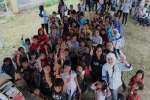Future Upsurge of Post-Pandemic Halal Tourism
By Adi Permana
Editor Adi Permana

*Grand Mosque at West Sumatra. Source: kemenparekraf.go.id
BANDUNG, itb.ac.id – The pandemic has impacted various sectors of the country, including tourism. The Salman Mosque of ITB organized a talk show with the Minister of Tourism and Creative Economy, Sandiaga Salahuddin Uno. The committee had also invited Ir. Budi Faisal, Ph.D. on Saturday (16/4/2022).
Before the pandemic, Indonesia was placed 9th globally among countries with the fastest tourism growth in 2018. Indonesia was also ranked 3rd in Asia and 1st in Southeast Asia. For half a century, the government has been trying to raise the number of travelers visiting the country; however, the pandemic causes the plan to divert and focus on improving the quality of tourism.

According to Sandi, halal tourism must be presented as agendas that prioritize health and safety. Its basic concept is unchanged, yet its implementation is adjusted depending on the current conditions.
Requirements for halal tourism are grouped into three categories: need-to-have, good-to-have, and nice-to-have. The need-to-have accommodations include halal food and worship facilities. On the other hand, good-to-have accommodations comprise Ramadan services and local Muslim experiences. Last is the nice-to-have accommodations such as recreational facilities that are Muslim-friendly and privacy-guaranteed.
According to data released in 2019, halal tourism owns a large market share. The expense of global Muslim tourism makes up 12% of the world’s tourist spending. Indonesia is ranked as the country with the 5th most Muslim tourists. Thus, halal tourism is not simply about the destination’s zoning, localization, or obedience to the Islam Law; it encourages the development of Muslim tourism that provides family-friendly services like halal food, lodging, and transportation.
“Other countries have designed this project with high enthusiasm. Therefore, the Ministry of Tourism and Creative Economy creates three main strategies for supporting this tourism, which revolves around innovation, adaptation, and collaboration,” Sandi elaborated.
Sandi noted that now is the time to uplift Indonesia’s economy. By implementing halal tourism in Indonesia itself as its main target market, the prospects of the tourism sector seem optimistic. For instance, Umrah travels can reach up to 700 visitors daily. “We will make a travel pattern concept so that people can visit various halal tourist spots before their departure,” he added. “We will also arrange Umrah posts on social media.”
Reporter: Kevin Agriva Ginting (Geodesy and Geomatics Engineering, 2020)
Translator: Ruth Nathania (Environmental Engineering, 2019)

.jpg)
.png)
.jpg)
.jpg)
.jpg)



